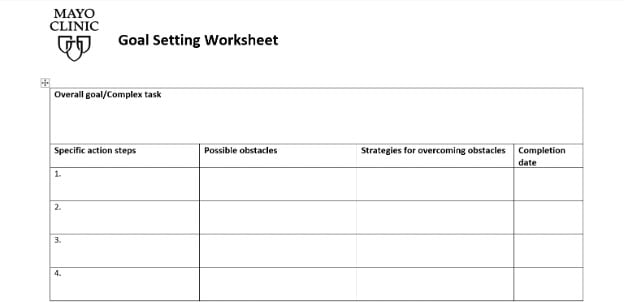Mentors guide and encourage mentees towards resources and opportunities that encourage growth and independence, while mentees communicate about their progress and areas of need as they work to accomplish their goals.
Mentors should encourage mentees to use the Mentoring Meeting Agenda, where mentees can document their questions, challenges, and topics they would like to discuss, ensuring a focused and goal-oriented meeting.
Additionally, the Development Plan is a good resource for mentors and mentees to identify SMART goals, decide on metrics, and formulate specific action steps to complete those goals.
What are common expectations within in the cultivation stage of mentorship?
Mentors’ responsibilities in this stage include:
- Recognize mentee’s strength and areas for growth.
- Advise based on your knowledge and experience.
- Help mentees find relevant resources to enrich their learning process.
- Assess understanding and progress to provide constructive feedback.
- Responds to mentee’s changing needs.
- Discuss any mentorship challenges and to address them.
- Cultivate mentee’s independence.
- Review mentorship plans to address any gaps and fine-tune action plan and objectives.
- Celebrate successes.
Adapted from University of Wisconsin-Madison Institute for Clinical and Translational Research
What are some methods to helping mentees master concepts and promote independence for future projects?
In this stage, mentors can use scaffolding methods to assist mentees understand new concepts or tasks. Scaffolding includes breaking goals or complex tasks into a step-by-steps process as seen in the form:
Mentors should keep in mind these additional methods for scaffolding:
- Verbalize your own thought process. Talk out loud as you problem solve or prioritize next steps or preferred methods.
- Promote teamwork by delegating tasks, soliciting input from others, and acknowledge individual effort and team progress.
- Role model effective communication, active listening, ethical behaviors, inquiry, provision of feedback, etc.
- Demonstrate activation of foundational knowledge to build connections with new content and support development of adaptive expertise.
- Ask higher-order level questions, provide opportunities for mentees to reflect on their learning and utilize coaching methods and strategies to guide learning and assess competency levels.
Adapted from University of Wisconsin-Madison Institute for Clinical and Translational Research
What are some ways I can effectively communicate with my mentee?
Listening strategies, questioning tools, and constructive feedback methods all contribute to effective communication during a mentoring relationship.
This short module, Cultivate Mentoring Through Effective Communication, includes a collection of resources you can use right now to help improve your own communication skills – and you can share these resources with your mentee as well.
What specific communication skills should I help mentees develop?
Written and verbal communication is essential for research scientists because they will need to effectively communicate their processes, results, and conclusions of their investigation to the scientific community and non-science stakeholders. Mentors can help mentees develop these communication skills by:
- Providing opportunities for mentees to present their work in small groups or laboratory seminars at least one time a year.
- Encouraging mentees to present in the preliminary stages of their research in informal settings, and solicit feedback for a variety of audiences and trusted sources.
- Encouraging mentees to refine their presentations through visual aids and text.
- Tailoring presentations based on the intended audience (e.g. community members, lab members, scientists in other fields, non-scientists, etc.)
Adapted from A Guide to Training and Mentoring in the Intramural Research Program at the National Institute of Health
What specific research skills should I help mentees develop?
Mentors can offer advice on potentials and challenges of new projects and ensure that hypotheses are clearly formed and explained. Mentors can also:
- Ensure that mentees use appropriate methods, keep good records, examine, analyze, and interpret data frequently.
- Encourage independence in identifying new research problems, formulating hypotheses, designing and conducting experiments, and presenting results to the scientific community.
- Encourage mentees to review relevant literature, to read critically and discuss published papers and pre-publications with senior researchers or within journal clubs.
- Recommend possible seminars, and regional or national meetings for mentees to attend.
Adapted from A Guide to Training and Mentoring in the Intramural Research Program at the National Institute of Health
How can I help mentees with career planning?
Mentors can review mentees’ interest and evaluations to suggest possible career choices, including research, education, employment in industry, science administration, science writing or biomedical law.
Mentees should be encouraged gather information about a chosen career path, then network to identify contacts and learn about structural and administrative requirements for a specific career path.
Additionally, mentors can evaluate and critique mentees’ CV and resume and provide resources for resume preparation and interview techniques.
Adapted from A Guide to Training and Mentoring in the Intramural Research Program at the National Institute of Health
How do I practice cultural awareness in mentorship?
Be aware of your own assumptions. We are shaped by our experiences, gender, social class, education, geography and other influences and it’s important to keep this awareness in mind so we can avoid thinking that others see the world in the same way.
Learn about how the mentee’s life experiences shape their perspectives. This will help you to better understand your mentee better and will lead to building a stronger mentoring relationship.
Acknowledge and address differences openly. The mentoring relationship becomes stronger when mentors and mentees can acknowledge and comfortably talk about differences.
Adapted from University of Wisconsin-Madison Institute for Clinical and Translational Research
For more information about cultural awareness in mentoring, visit: Culturally Aware Mentoring Resources
/0x0:512x512/prod01/channel_2/media/mccms/content-assets/about/academy-of-educational-excellence/size-512X512_HERO-academy-mentor-lab-1592435_3852665_0004-(1).jpg)
